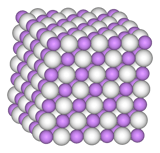The Wikipedia article Salt (chemistry) starts off with "In chemistry, a salt is an ionic compound that results from the neutralization reaction of an acid and a base." This seems like a pretty good Chemistry 101 definition. So, in essence, this means having an anion and a cation in the salt, which further implies ionic bonding. This seems like a pretty reasonable place to start.
I'd think that the definition could be tweaked to say "a salt is a solid ionic compound..." That would indicate that one "molecule" isn't a salt. So one molecule of NaCl in the gas phase is a molecule, not a salt. I also have trouble thinking of molten NaCl as a salt. So I'd describe it as a "molten salt."
Kind of like way I think German works. I'd expect that German would have some compound word for "molten salt" which better denotes that there is one new idea. So in English if a "salt" is a solid that has a 3D crystal lattice how can a salt be "molten"?
In general, there are a lot more organic salts than inorganic, so dissolving in water isn't a good restriction.
These last paragraphs point out the sorts of problem in trying to make such a definition absolutely unambiguous. You get a one sentence definition, then two pages of qualifications which render the definition useless.
I can't think of a solvent in which you could dissolve lithium hydride and I don't see how you could get lithium hydride as a neutralization reaction, so I wouldn't think of it as a salt. I don't know a better word than "salt-like" to describe such a crystal structure of anions and cations.

